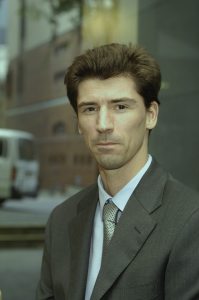Marcello Tonelli

Current course of study:
PhD in Business
Research topic:
Modelling corporate real estate decision making in the service industry
Start/anticipated completion date:
September 2003 /
Research contribution to theory:
This research is presenting a conceptual model which builds on Resource-based Theory of Competitive Advantage (Porter M.E., 1980; Barney, 1991), Systems Theory (von Bertalanffy, 1950), and Change Management Theory (Hammer and Champy, 1993), arguing that CRE decisions be broadened to include customers (Approach-Avoidance Behaviour), HR (Industrial Psychology, Intellectual Capital), and internal processes considerations. The design of the conceptual model based on System Dynamics Methodology (Forrester, 1961) allows for the inclusion of causal relationships, time delays, and feedback structures, and thus also extending Kaplan and Nortons (2004) Balanced Scorecard.
As such, this is a significant departure from the majority of CRE management literature which suggests that the built environment be considered only in terms of purely financial decisions. It is also a substantial contribution to the rest of the CRE literature which is generally based on empirical studies and lacks of a theoretical framework to support the argument that a building helps position the company in its competitive environment.
Research contribution to industry practice:
CRE decisions imply for most businesses large capital expenses and generally decisions are made by people who do not have all the necessary information, because the data required to make the most sophisticated and accurate choice span across the entire organization (IT, HR, finance, marketing, sales, R&D). The use of an expert decision support system based on cognitive maps, that captures the expertise from the different departments without having to assemble people together will make a fully informed and better decision. Furthermore, the researcher argues that tacit knowledge is an important component of decision making (Nonaka, 1994; Hertog and Huizenga, 2000), which transfer is generally difficult, because we can know more than we can tell (Polanyi, 1966:4). The use of expert systems allows converting such tacit knowledge into explicit knowledge (Hedlund, 1994) that is then made available to others through information systems (e.g. simulations).
This new conceptual framework potentially offers considerable insights for management. For instance, it is expected that managers would be interested in knowing how the prestige of a building impacts on their customers, and how this influences their customers future repurchase intentions. In other cases the focus might be on how an internal layout should be arranged so as to facilitate movement and encourage patterns of communication within HR; or again how the choice of a particular location will impact on promotion and the selling process.